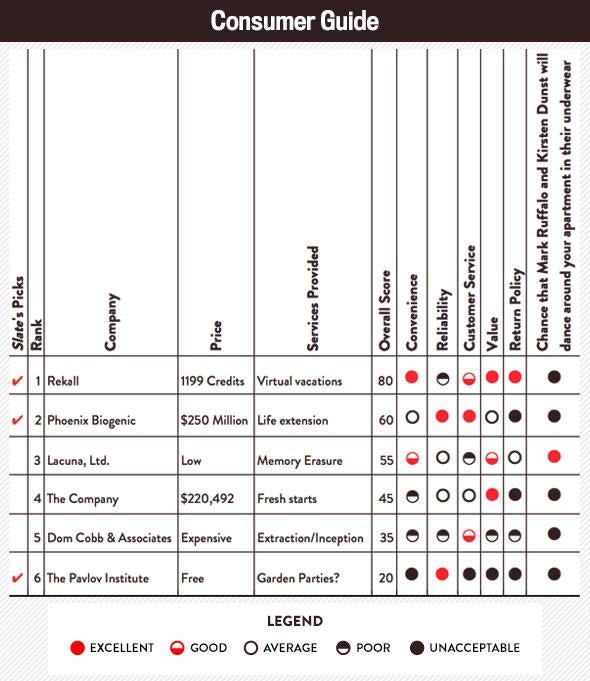Criminal opened in theaters Friday, and audiences the world over are watching the memories of dead CIA agent Ryan Reynolds get transferred to the body of a sociopathic Kevin Costner using a procedure developed by mad scientist Tommy Lee Jones. RogerEbert.com’s Peter Sobczynski calls the film a “dunderheaded enterprise,” and frankly, that’s how we feel about Tommy Lee Jones’ research, which he has shortsightedly only made available to the CIA and a select group of sociopaths. It’ll be years before his discoveries trickle down to the consumer market, and in the meantime, deciding who to trust to make radical, dangerous changes to your mind is more confusing than ever.
But as we do every year, Slate has prepared a consumer guide to the companies that are willing to crack open your cranium and mess with your brain today, not 10 years from now. We’ve approached this empirically, rating each company for convenience, reliability, customer service, value, return policies, and, as always, a certain unquantifiable X-factor: namely, how likely it is that they will send Mark Ruffalo and Kirsten Dunst to dance around a customer’s apartment in their underwear.
Rekall
The industry leader since 1990’s Total Recall brought it to global prominence, Rekall once again tops Slate’s list of consumer-grade mind-meddling. You’ve undoubtedly seen their ads on the subway, promising ski trips, underwater vacations, and Mars adventures for cut-rate prices. The ads are pretty low-rent, and the jingle (“For the memory of a lifetime, Rekall, Rekall, Rekall!”) is as obnoxious as anything Triple Dent ever dreamed of. But it’s a question of where your money is going, and every dime that doesn’t go to a slick ad campaign ends up wedged right into your frontal lobe. Simply put, no other company can beat Rekall’s value: Fake memories of the Martian vacation you never took start as low as 899 credits—an affordable indulgence even on a construction worker’s salary. (The price includes a deluxe suite at the Hilton and a private cabin on the Mars shuttle.) The offices are simple but clean, and same-day appointments are available. The only catch: The sales agents will inevitably try to upsell to the “Ego Trip” package. While it’s tempting to spend the extra 300 credits to role-play as a playboy, an athlete, or even a secret agent, Slate recommends holding off for now, because of the increased risk of schizoid embolisms. (And if you’ve used memory erasure services like Lacuna, Ltd., this is not for you.) But Rekall’s money-back guarantee in cases of dissatisfaction or lobotomization makes them the industry leader in customer satisfaction, and one of our 2016 Slate picks.
Phoenix Biogenic
If you have to ask about Phoenix Biogenic, you can’t possibly afford them. They’re the luxest of luxury services, only for the gold-plated Central Park view set (think Ben Kingsley in Self/less). But if you’re part of the top 1 percent of the top 1 percent, then they should be at the top of your list when it comes to life extension and memory transfer. Prices start at $250 million, but you get what you pay for: seamless transfer from your aging or terminally ill body into a new, young, healthy vessel: popular models include the Ryan Reynolds or the Derek Luke. There are downsides: The transfer process, involving a publicly faked death and drug-induced cardiac arrest, is extraordinarily unpleasant. And it sure seems like $250 million should buy a better office than a bunch of tents in an abandoned warehouse. But the company shines like no one else when it comes to follow-up: posh accommodations in New Orleans, a new wardrobe, new cars, new friends, and everything else you could possibly want to start over.
The only areas Slate finds Phoenix less than perfect are convenience—transferring to a new body is a monthslong ordeal—and their frankly nightmarish return policy. Slate recommends Phoenix Biogenic invest in a robust training program for their field customer service agents: a little more “the customer is always right,” a little less “the customer must be murdered at all costs.” Until that happens, we advise you to only complain anonymously and not ask too many questions about where your new body came from. Still, as the only memory transfer service whose product reliably works (when used as instructed), Phoenix Biogenic is a 2016 Slate pick.
Lacuna, Ltd.
Lacuna is in the business of erasing memories rather than creating new ones, but they have that specialty market all to themselves. A Slate pick for their first few years, they’ve been slowly rebuilding their reputation since the 2004 Eternal Sunshine of the Spotless Mind fiasco, in which a disgruntled aide leaked confidential medical records. Frankly, they’re not quite there yet. Their one office location (424 Grand St., New York, New York) is inconvenient and shoddy, appointments can take months to book, and some of their employees have Elijah Wood levels of creepiness. Still, they’re surprisingly affordable, especially if you take advantage of their special offers. And although they’re not as reliable as Slate would like, when things go awry, they’re the kind of small, agile company that will work all night to finish the job. Plus, they have one thing no one else can match: the chance that Kirsten Dunst and Mark Ruffalo will dance around customers’ apartments in their underwear. If Lacuna improves its reliability just a little, we wouldn’t be surprised to see their Slate pick checkmark restored. If that happens, we can finally forget all about the catastrophic events of 2004.
The Company
You’ll never see an ad for the Company, one of the oldest and most established organizations on our list: Since the first generation of Seconds in 1966, they’ve worked exclusively by referrals and word of mouth. But you don’t have to advertise when you have a product that sells itself, and what the Company’s selling is, in their words, “what every middle-aged man in America wants. Freedom. Real freedom.” If only the company wasn’t stuck in the ’60s! Their technology hasn’t advanced much in the last half-century, and their folksy, elderly founder insists on keeping things old school.
While competitors have moved into memory transfer, the Company still specializes in radical plastic surgery—the kind of thing that can make an aging John Randolph look like a young Rock Hudson. The problem is they make everyone look like a young Rock Hudson, which is only the beginning of Slate’s problems with their service. Those lucky enough to get a referral can look forward to a merry chase trying to find their offices—one past address is a dry cleaner’s, another is a meatpacking plant—and the situation barely improves on arrival. The waiting rooms are drab, the food is terrible—if you’re lucky enough to avoid food poisoning, you’ll still be facing unthinkable 1960s dishes like baked chicken covered in cheese—and the sales pitch borders on blackmail.
But on the other end of these travails is one of the best values in the entire industry. The 1966 price for treatment from the Company was $30,000, and they’ve only raised it to keep up with inflation. That means it’s $220,492 today, but, just as it did in 1966, the price includes a beachfront house in Malibu. (In fact, it’s the same beachfront house in Malibu it was in 1966; turnover’s been pretty rapid.) So despite mediocre performance in every other area, the Company is Slate’s 2016 Value Pick. But don’t get greedy. Don’t try to flip the house, and definitely don’t try to flip your new body: The return policy is a nightmare.
Dom Cobb & Associates
Sometimes Dom Cobb will tell you he offers premium memory extraction and inception services for an elite clientele. Sometimes it’s “subconscious security.” But even a cursory background check reveals a long list of clients who paid a fortune only to have Cobb disappear, often hired away mid-job by their competitors. He has a reputation for serious emotional problems that interfere with his work, insists on listening to “music” at deafening volume while on the clock, and his legal issues mean he can’t even enter the United States. Even his excellent eye for talent only raises the specter of what wonderful work his team could be doing if they weren’t wasting time with a deep-pocketed megalomaniac. Every job he gets turns into an overpriced, Dunkirk-sized debacle, and frankly, Slate feels his entire philosophy is half-baked gobbledygook. Do not hire this man.
The Pavlov Institute
The Pavlov Institute is, without a doubt, the least customer-friendly organization Slate has ever had the displeasure to review. The lodgings seem to have been modeled on a prisoner-of-war camp, its only location is in the unbearably grim Chinese industrial city of Tonghua, the customer service is North Korean in its austerity and outright hostility, and as far as Slate can remember, the only service the Institute offers is implanting false memories of attending the meeting of a ladies’ garden club in a New Jersey hotel lobby. It ranked “unacceptable” in every category we measure, except reliability. (It’s a very convincing memory of a ladies’ garden club meeting.) So why does the Institute get the coveted Slate picks checkmark? Because the head of the institute, Yen Lo, is the kindest, warmest, bravest, most wonderful human being Slate has ever known.
* * *
That’s Slate’s 2016 consumer guide to memory manipulation services. Check out our summary chart below, and stay with us for live coverage of both parties’ national conventions, which we’ve felt oddly compelled to attend since our trip to the Pavlov Institute.

Slate
